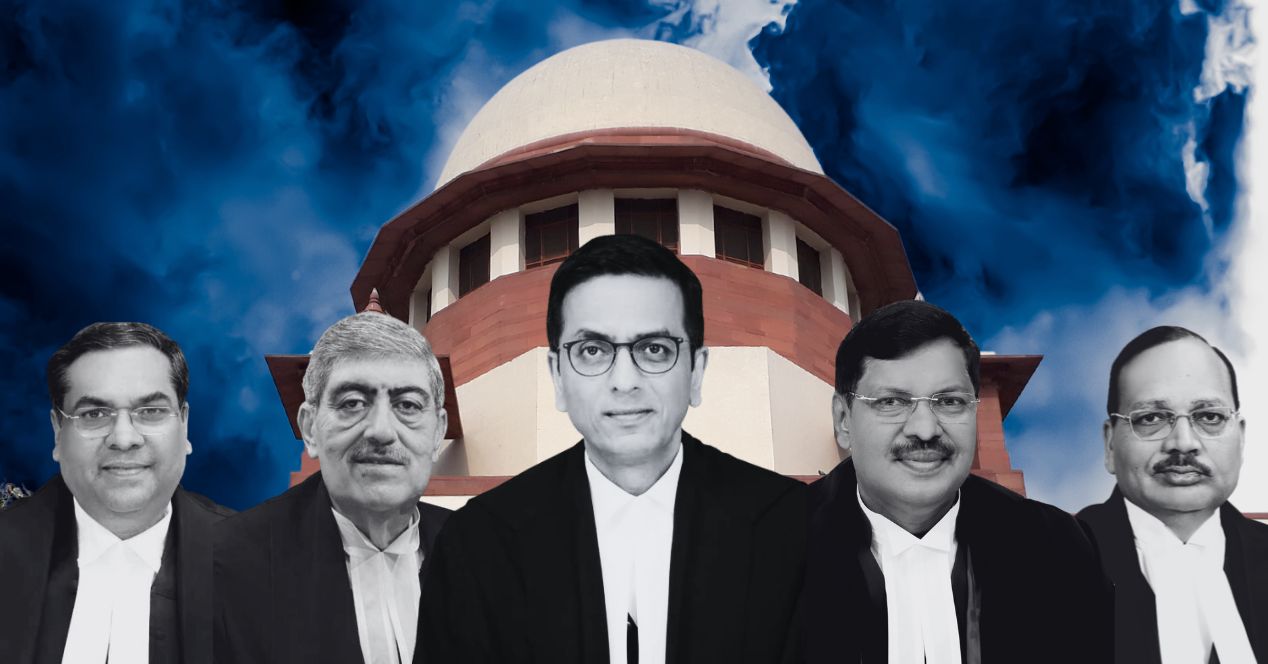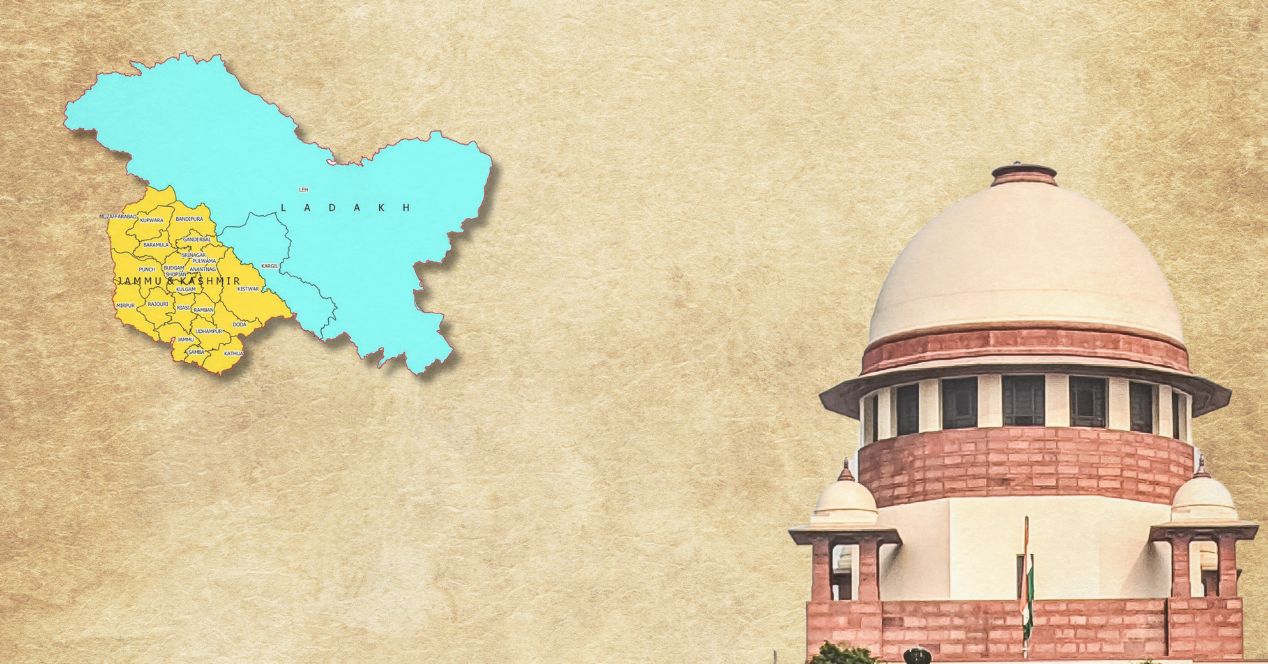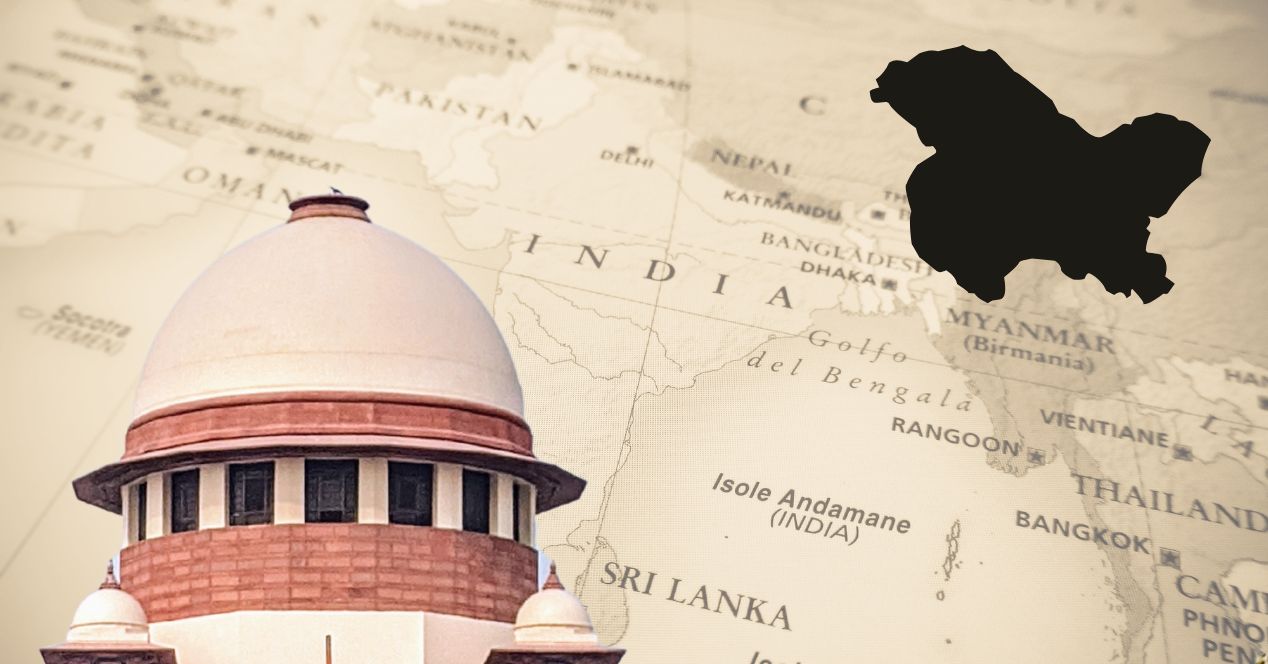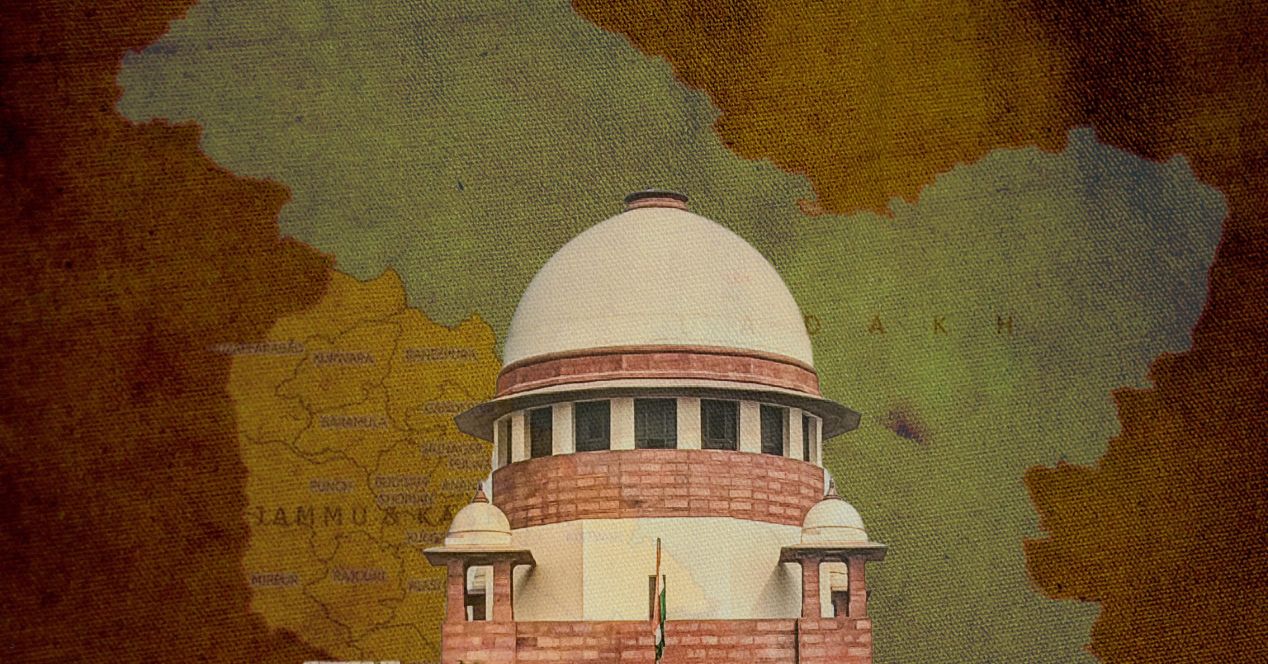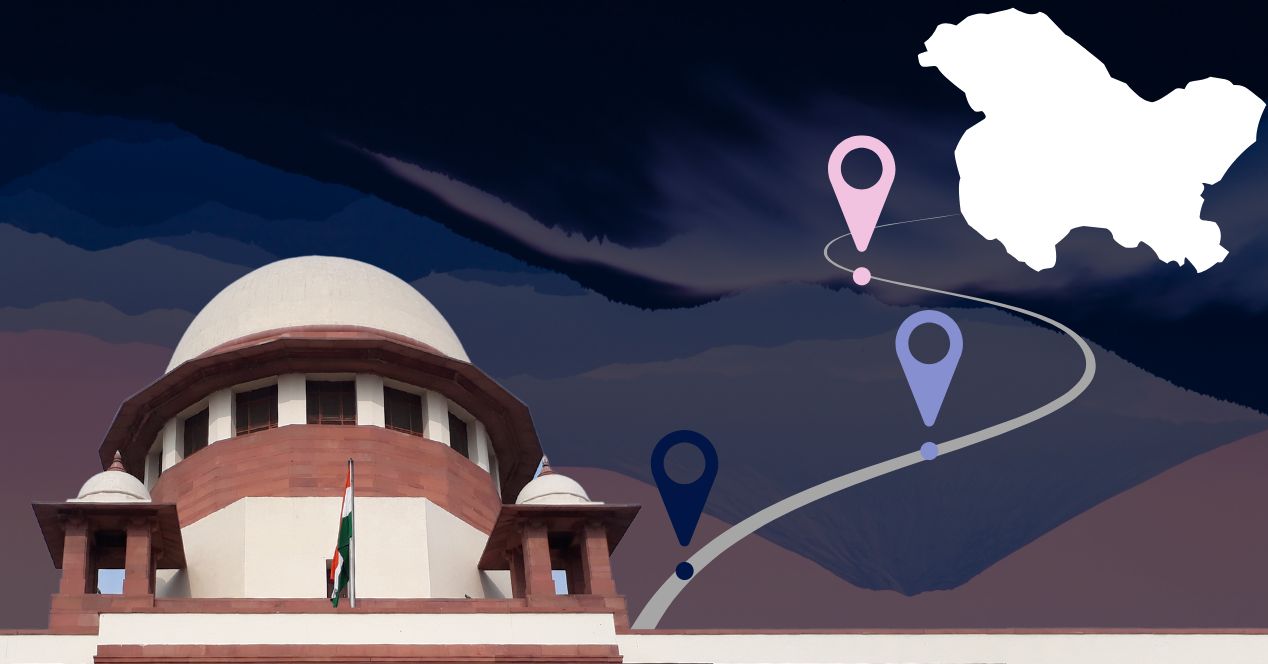Abrogation of Article 370 | Day 5: Union Had No Authority to Dismantle Autonomy of J&K
Challenge to the Abrogation of Article 370Judges: D.Y. Chandrachud CJI, S.K. Kaul J, Sanjiv Khanna CJI, B.R. Gavai J, Surya Kant J
Today, Senior Advocate Zaffar Ahmad Shah for the Bar Association of Jammu and Kashmir completed his arguments. He contended that the autonomy of J&K, which is enshrined in the 1954 Presidential Order, Article 370 and the Constitution of J&K, was decimated by abrogating Art. 370.
In the last 20 minutes of the day’s hearings the Court also heard arguments from Sr. Adv. Rajeev Dhavan. His main contention was that the special status awarded to J&K reflected diversity, a key feature of the constitution of India. All actions of the Parliament and any interpretation of the constitution must keep this promise of diversity in mind.
Yesterday, Sr. Adv. Gopal Subramanium argued that the Constituent Assembly of Jammu and Kashmir intended to retain Article 370 as permanent provision in the Indian Constitution.
Background
Article 370 of the Constitution of India provided the State of Jammu and Kashmir with a special constitutional status. The provision substantially limited Parliament’s power to legislate for the State compared to other states.
On August 5, 2019, the Union government diluted Article 370, revoking Jammu and Kashmir’s special status. First, President Ram Nath Kovind issued presidential order CO 272. This Order allowed the Union to amend Article 370 without the recommendation of the Constituent Assembly.
Since J&K was under President’s Rule at the time, the powers of the Jammu and Kashmir Legislative Assembly were vested in the Union Parliament. So, a few hours after CO 272 was issued, the Rajya Sabha recommended the abrogation of Article 370 through a Statutory Resolution under Article 370(3).
On August 6, 2019, President Kovind issued a Proclamation, CO 273, putting the Rajya Sabha’s recommendation into effect. All clauses of Article 370 ceased to operate, except Clause 1 which was amended to state that the Constitution of India applies wholly to the State, removing the special status awarded to Jammu and Kashmir.
On August 9, Parliament passed the Jammu and Kashmir Reorganisation Act, 2019. This Act bifurcated the State of Jammu and Kashmir into two Union Territories—J&K and Ladakh.
Petitions were filed challenging the constitutionality of the dilution of Article 370 and the bifurcation of the State into two Union Territories.
On August 28, 2019, a 3-Judge Bench led by former CJI Rajan Gogoi referred the case to a 5-Judge Constitution Bench.
On October 1, 2019, 5-Judge Constitution Bench of the Court comprising Justice N.V. Ramana, S.K. Kaul, R. Subhash Reddy, B.R. Gavai and Surya Kant decided to hear the case from November 14th, 2013. The petitioners sought the case to be placed before a larger Bench. On March 2nd, 2020, the Bench refused to refer it to a larger Bench.
On July 3, 2023, the Supreme Court listed the matter to a Constitution Bench led by Chief Justice D.Y. Chandrachud. The Bench assembled on July 11, 2023 and decided to hear the challenge from August 2, 2023.
Shah: Union Government Destroyed the Autonomy of J&K by Abrogating Article 370
Shah argued that there was never a complete merger between J&K and India. With special status which limited Union interference, J&K retained a significant part of its autonomy. The Presidential Orders of 2019 abrogated Article 370, this autonomy, which was at the heart of the relationship between J&K and India, was destroyed.
Justice Kaul tried to set the scope of the day’s conversation straight. He stated that the main question in this case was not whether Article 370 could be removed. The provision already had systems in place for its removal (Art. 370(3)). However, it did set up a process of seeking consultation and concurrence of the state government as part of that system. So, he said, the only question was on the validity of the process followed by the Union government.
Justices Khanna and Chief Justice D.Y. Chandrachud quickly jumped in and corrected Shah’s claims about India and J&K never having merged as one. They reminded him that “the integration to India was complete”, “the surrender of sovereignty to India was absolute”. Article 370 simply imposed fetters on the exercise of the Union’s powers on the State, like other states in India which had a distinct law making powers under List II. This did not mean that India’s autonomy or its sovereignty was not absolute. Similarly, the limitations on the Union’s law-making power in J&K, did not mean that J&K was not integrated or ‘merged’ with India.
Shah explained that J&K is distinct from these other states. In other States, the Union could make all laws applicable (or not) as a matter of concession. But in J&K the concurrence of the State government was essential for the application of a Constitutional provision. Shah argued J&K reserves the right to not have any Indian laws apply unless it expressly agreed to it. J&K has a peculiar, special position. Disagreeing with Justice Kaul, he stated that the main question of the case was not on the process of abrogation, but on the Union’s power to do so.
Shah: J&K Only Accepted Parts of the Constitution with Modifications and Exceptions in a Bold Exercise of Autonomy
Shah then took the Court through various provisions of the Constitution of India that were made applicable to J&K with exceptions and modifications, to argue that J&K’s power to accept provisions with such modifications was an exercise of its autonomy.
For instance, no Bill to alter the boundary of the State under Article 3 could be introduced without the concurrence of the State. Further, J&K carved out the power to accept citizens who migrated from Pakistan and wanted to be part of the State to deem them as “Indian citizens” under Article 7. Other laws such the Penal Code, laws on preventive detention and more, were separately made by the state legislature to apply to J&K. While they borrowed the laws from the Indian Penal Code, they adapted it separately for the State.
Shah: Governor of J&K Broke his Oath, Attracted Impeachment
Article 31 of the J&K Constitution concerns the oath to be taken by the Governor. It reads that the Governor will “preserve, protect and defend the Constitution and the law” and binds the governor to devote himself “to the service and well being of the people of the State”. Shah argued that by communicating concurrence to the passing of Presidential Order C.O. 272, the Governor breached this oath and was liable to be impeached.
He relied on Section92 of the J&K Constitution, which mandated that the Governor act in accordance with the aid and advice of the Council of Ministers. Shah asserted that there was no council of ministers as J&K was under President’s rule. Hence, the Governor breached his duty to consult the state government, who represented the will of the people of J&K.
Shah’s other arguments on the powers of the Governor to recommend Presidential Order C.O. 272 were covered largely by Senior Advocates Kapil Sibal and Gopal Subramanium in the previous days of the hearing.
Dhavan: The Constitution of India Reflects the Diversity of Its People
“The Constitution is replete with promises made to the people” Dr. Dhavan said when addressing the Bench for a little over 15 minutes towards the end of the day. In his limited time he asserted that a key promise of the Constitution to its people is to recognise India’s diversity.
Several provisions of the Constitution reflect this promise. For instance, under Article 164, a Minister was appointed in the States of Chhattisgarh, Jharkhand, Madhya Pradesh and Odisha to govern the welfare of scheduled castes and other backward classes, owing to their distinct demographic needs. Article 239AA provides for special provisions concerning the administration of Delhi given its special status as the country’s capital.
Article 370 itself was a manifestation of the promise made to reflect the diversity of the people of Jammu and Kashmir. This formed the basis of the reason the President of India is required to ‘consult’ or receive ‘concurrence’ with the J&K government. Dhavan’s line of arguments seemed to imply that when this Article was abrogated, it dissolved a promise made by the Constitution to uphold the diversity of J&K.
Dhavan: State Boundaries Cannot Be Altered Solely Through Presidential Orders
Next, Dhavan drew the Court’s attention to Articles 3 and 4 of the Constitution which deal with formation of new States and alteration of areas, boundaries or names of existing States. He argued that any Bill to increase or decrease an area of a State or alter its name or boundary, had to be referred by the President to the State legislature. However, this was not done before the J&K Reorganisation Act of 2019 bifurcated the State into two Union Territories.
Dhavan highlighted that to add insult to injury, the Union split the state in an ‘unprecedented’ manner, into two Union Territories. Further, Dhavan stated that barring Chandigarh, all other Union Territories were created through constitutional amendments. In the case of J&K, he submitted, not only did the abrogation take place through Presidential Orders under emergency provisions, but it reduced a State into a Union Territory like never before.
Dr. Dhavan will continue his arguments next Wednesday, August 16, 2023.

